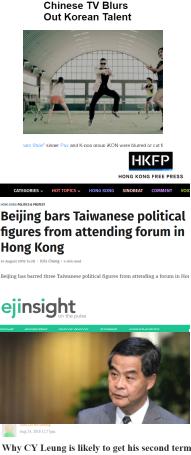Against China’s wishes, South Korea is allowing the US to deploy an advanced anti-missile system on its territory. Beijing’s response: banish Korean entertainment stars from Mainland TV. The President of Taiwan, Tsai Ing-wen, omits any mention of the ambiguous ‘One China’ slogan favoured by Beijing and the last KMT administration in Taipei. China is retaliating by, among other things, barring certain (especially non-KMT) Taiwanese from attending events in Hong Kong.
Some observers see a carefully calibrated, cunning method to China’s prickliness; others see toy-throwing temper-tantrums born out of frustration. The pettiness of these reactions  seems to reflect a combination of Beijing’s anger and its lack of practical alternative forms of protest. One thing we can be sure of is that these episodes reveal what Beijing considers most important and sensitive.
seems to reflect a combination of Beijing’s anger and its lack of practical alternative forms of protest. One thing we can be sure of is that these episodes reveal what Beijing considers most important and sensitive.
This is valuable to Hong Kong, which now faces a struggle to defend its freedom and way of life from the control-obsessed regime in Beijing – a regime likely to double down in its attempts to undermine local institutions and neutralize opposition. The old moderate pro-democrat route to reform and improved governance is dead. Many business and professional interests have been co-opted or cowed into silence. Resistance comes down to a disorganized assortment of radicals and free-thinkers with a potentially broad support base among the population.
Their main method looks set to be trolling and rattling Beijing: identifying what makes the regime most paranoid, and piling it on. It would be cruel and immoral to discipline a child who fears the dark with threats of a monster that comes out from under the bed when the lights are out. But a Leninist dictatorship is fair game. If Chinese officials lie awake at night petrified of ‘Hong Kong independence’, give them ‘Hong Kong independence’.
Beijing’s decision to take greater control of local immigration affairs shows us that the Communist Party is also petrified of opposition groups in Hong Kong and Taiwan coming together to ‘create a front to counter Beijing’s predatory – and sometimes [sic] atavistic – ideology’. Excellent. Sounds like a good time for Edward Leung, Joshua Wong or other unpatriotic local demons to take a few trips to Taipei for mysterious closed-door meetings with the Sunflower activists and other rebel counterparts across the Strait.

Thoroughly interesting and informative.
Right on!
But where I differ slightly from your objective analysis-cum-call to arms is in its optimism.
CY and co. are in a position of strength; the result of all the gerrymandering, nobbling and slander may be just that intended, namely winning the Legco elections and “elections”.
True it’s a short-term aim, a disingenuous combination of intimidation and populism, cynically disregarding pretty much anything honourable. But that’s its strength. In sum, I’m not convinced of the “potentially broad support base”, that CY/Carrie won’t win a two-thirds majority.
Leaving aside two leaflets from the two candiates for my functional constituency I have many (not counted but probably at last 10) leaflets in my lettr box from candidates for HK island. The pro democrats (including localists, peoples etc) seem far more fractured than the none CY challengers (DAB and FTU) so who am I to vote for to make it count, strategically? How is anybody to decide, unless they are a member of an existing party?
I am waiting for someone to invite Scottish National Party leader Nicola Sturgeon to Hong Kong. Admit her as the head of a a respected British political party, and encourage the local independence advocates, or exclude her as a dangerous splittist, and upset relations with the UK? An interesting choice.
By the way, Blogger’s spell checker does not recognise splittist as a real word – which is as it should be.